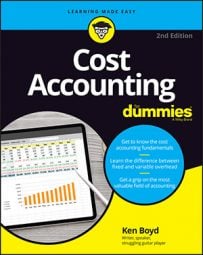When cost accounting, to determine what may be a reasonable and fair price you must consider the cost for the product or service you provide. That’s your starting point: Consider whether or not the costs are fair. After you and the other party agree, you can discuss a fair profit and price.
Many companies generate a majority of their business through government contracts (contracts with federal, state, and local governments). Most government entities require competitive bidding. That means that multiple vendors provide confidential bids for the work. The government then selects a vendor to perform the work.
The party selected normally is the low bidder; however, there may be other factors that affect the selection of the vendor. The government usually wants an experienced vendor who can meet a deadline. The contract likely requires vendors to provide references. So the lowest bid might not necessarily be selected.
Competitive bidding is most appropriate for work that’s not unusual or unique. There are a few reasons why. If the work is common, the government is able to find multiple bidders. Also, bidders have enough data from other work to submit well-planned bids.
When contracting for a municipal swimming pool, the city or state should be able to find multiple bidders. The work is fairly common. The bidders (also called vendors) likely have all built municipal pools before.
Things get tougher for both parties when the work is unusual or unique. Say the federal government wants bids on a manned spaceship to fly to Mars. There aren’t many companies that have the staff and expertise to build spacecraft, much less a vehicle that could go to Mars. Even having built a spacecraft that can go to the Moon won’t provide all the experience needed for a Mars mission.
There’s a lot at risk for a potential bidder. It is difficult to know all the costs that need to be incurred. After all, you can’t go to the web and research other companies that have built a similar product. Given the dollar amount involved and the uncertainty, companies may not be willing to bid.
Ultimately, both parties need to agree on what’s reasonable and fair. For common work that goes through competitive bidding, there’s historical data to determine what’s reasonable and fair. For unique work, the process is harder. If you could take time negotiating, you can nail down your definitions of reasonable and fair costs and prices.
The trouble is that sealed, competitive bids don’t allow for negotiating. At best, there is a “question and answer” process, where all bidders’ questions — and the answers — are available for all bidders to see.

